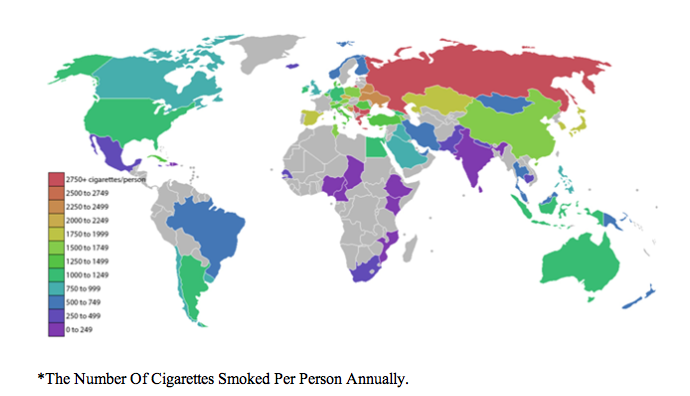Smoking vs. Governments Worldwide: Which Will Win?
Smoking is dangerous and needs to be regulated across the world. Smoking cigarettes causes a variety of diseases, including cancer in some body parts (lungs, liver, throat, stomach, etc.), vision failure, and increased blood pressure, and thickened blood vessels. In addition, it can cause heart attacks, strokes, diabetes, and early death. Once having smoked the first several cigarettes, one will be enslaved by the addiction for tobacco and nicotine. “There’s no doubt about it — quitting smoking is tough,”- Pamela Worth, who claims, during her interview, that she quit smoking for her health.
Cigarettes contain nicotine, which affects the balance of chemicals within the brain. Smoking affects the levels of the chemicals dopamine and noradrenalin, causing smokers to feel a rapid mood change. Smokers find this to be enjoyable. When the nicotine reaches one’s brain, it produces a feeling of pleasure and satisfaction. Other reasons for smoking include concentrating better, to relieve stress, and as a pleasant distraction from boredom or loneliness.
According to TobaccoFreeCA, smoking cause economic problems, such as businesses worldwide losing money due to smokers missing work often for illness. For example, in California, loss of productivity costs businesses $8.5 billion in one year.
According to the Center for Disease Control and Prevention, in 2014 there were nearly a billion smokers worldwide. Tobacco was first used around 5000 B.C.E. The percentage of people smoking is rapidly increasing. Today, worldwide, five million people die from smoking tobacco every year.
Center for Disease Control and Prevention 2014:
Annual Deaths from smoking in a country
U.S: 443,000 people
China: 1.2 million people
Europe: 650,000 people
Japan: 129,000 people
Smoking cigarettes is a phenomenon around the world. According to Tobacco Atlas, in 2011, the tobacco industry spent $8.4 billion on cigarette advertising and promotions each year. Each year, tobacco use costs the United States approximately $133 billion for direct medical care for the number of smokers and $156 billion in lost productivity.
Based on the report from the Centers for Disease Control and Prevention, the top leading causes of death worldwide includes heart disease and cancer. Smoking causes all of these. So if smoking is the number one cause of death, why doesn’t the government do anything about it? People all over the world want to abolish smoking. However it would lead to havoc. If a national law banning smoking were created, then smokers would be likely to riot. Prohibiting smoking isn’t possible. Even if it were banned, it wouldn’t stop addiction and smokers would find ways to smoke secretly. On the other hand, in mid-2009 in the U.S, Congress passed a law that for the first time gave the Food and Drug Administration authority to regulate tobacco products, allowing it to reduce the addictiveness and harmfulness of tobacco. According to the ShanghaiDaily, in China, the National People’s Congress have not passed a tobacco control law, although there are several tobacco regulations such as a ban on certain types of advertising. In spite of that, Chinese people are continuing to smoke. In other places around the world, smoking is prohibited by law and subject to heavy fines.
One way around the regulations has been the use of e-cigarettes. People are buying e-cigarettes to replace tobacco cigarettes. Electronic cigarettes were first developed in China in 2003 and then came to the U.S market in 2007. According to Americans for Nonsmokers’ Rights, e-cigarettes are a rechargeable device that allows a person to inhale and exhale nicotine with the look and feel of real tobacco. The tobacco company that makes those cigarettes, Njoy, calls them a “safer alternative” to smoking. E-cigs, instead of burning tobacco, burns liquid in vapor and then is inhaled or “vaped”. In 13 states, minors and teenagers can legally purchase e-cigarettes.
However, e-cigarettes still cause many health risks. E-cigarette smokers complained that e-cigarettes can cause trouble breathing, headaches, coughing, dizziness, sore throats, nose bleeds, chest pains, and allergic reactions. According to UCSF Medical Center, the nicotine in e-cigarettes is very addictive and when use is stopped, it will cause irritability, depression restlessness and anxiousness. In 2012, a smoker in Florida was severely injured due to an e-cigarette that exploded in his mouth. E-cigarettes are also dangerous for people with heart problems. It is unclear how many chemicals are produced by vaping, but it is proven to be less than a regular cigarette smoke. Although, some evidence suggests e-cigarettes are safer than regular cigarettes, there is still not enough known about the long-term risks and effects of e-cigarettes.
In conclusion, smoking any kind of cigarette is a problem throughout the world. Smoking contributes to the number one cause of death in the world- heart disease. Because of this, there should be stricter regulations. Even though it may be impossible to fully regulate smoking (because of the addictive effect of tobacco on smokers), governments worldwide will continue to attempt regulating smoking by banning advertisements of tobacco products in the hopes of eliminating this terrible addiction.












